What to Know
Why Is My Puppy’s Nose Dry?
Is your puppy’s nose dry?
A puppy’s nose should be wet and moist, but if it becomes dry, there may be a problem. Possible causes of a dry nose in puppies include dehydration, allergies, and bacterial infection.
If you are concerned about your puppy’s dry nose, take him to the veterinarian for a diagnosis and treatment.
Take your puppy to the vet if his nose is persistently dry to rule out any serious health concerns.
Puppy owners should be aware of the common causes of a dry nose so they can seek veterinary help if necessary.
Learn more about how to keep your puppy’s nose healthy by reading our article on the subject!
Dog Dry Nose Treatment and Prevention
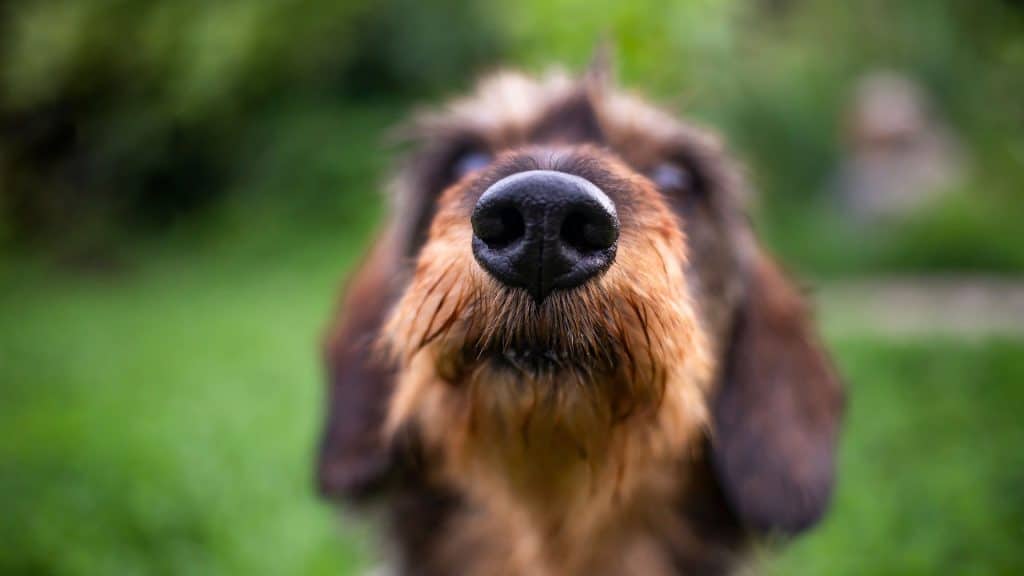
Your dog’s nose is essential to its health, and it’s crucial to keep an eye on it. A dry nose can signify dehydration, allergies, or even a cold.
While a dry nose isn’t always caused for alarm, it’s essential to know the potential causes and treatments.
Dehydration is the most common cause of a dry nose, so ensure your dog has access to fresh water.
Talk to your vet about possible treatments if you think allergies may be to blame. Sometimes, a simple diet change may be all that’s needed.
If your dog’s nose is dry and cracked, it may need extra TLC. Petting them with a soft cloth can help relieve discomfort.
You can also use a specially-formulated ointment to soothe and protect their skin. You can help keep your dog’s nose healthy and happy with some care.
What Keeps Your Dog’s Nose Cool and Wet?
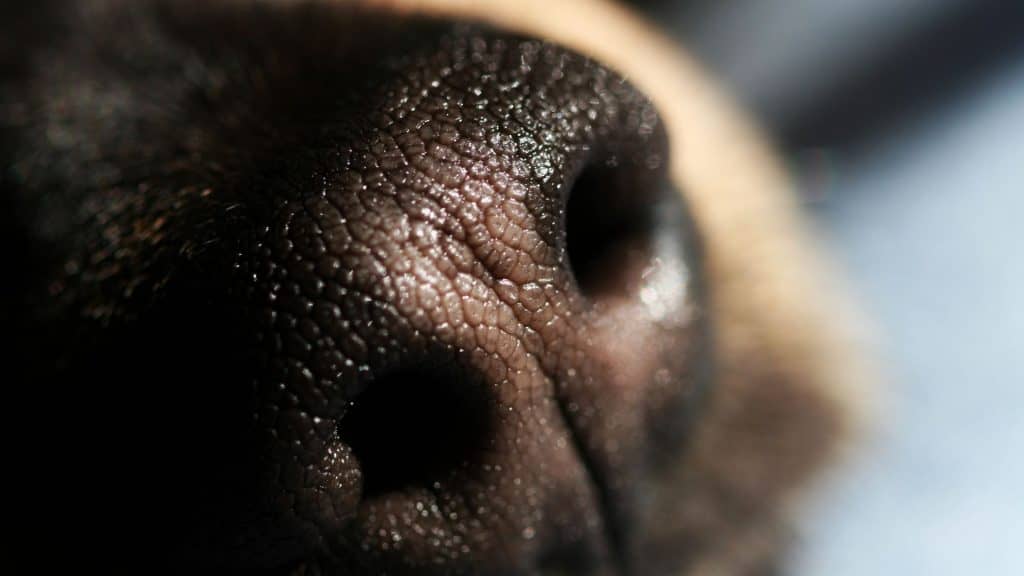
Although you might not think it, your dog’s nose is susceptible. Keeping the nose wet is essential since it helps absorb scent molecules. A dry nose can make it difficult for your pup to smell correct.
There are a few things that could cause your dog’s nose to be dry:
- Allergies
- Environmental factors (dry air, etc.)
- Respiratory infections
- Autoimmune disorders
- Cancer
- Trauma (from an injury)
- Kidney disease
- Diabetes
- Dehydration
- Nutritional deficiencies
- Normal aging process
It could be painful and uncomfortable if your dog’s nose is dry and cracked. You’ll want to take them to the vet to check out and find the underlying cause.
In the meantime, you can help soothe their nose with some coconut oil. Just apply a small amount to their nose several times a day.
Autoimmune Diseases that Cause a Dry Nose in Dogs
There are a few autoimmune diseases that could be the reason for your dog’s dry nose. These include:
- Lupus
- Pemphigus
- Systemic sclerosis
- Dermatomyositis
- Vitamin A deficiency
Autoimmune diseases are often treated with immunosuppressive drugs. These help to lessen the activity of the immune system.
This can help to reduce inflammation and keep your dog’s nose from drying out.
High Body Temperature or Fever
Dogs have a uniquely high body temperature, which makes them susceptible to heatstroke. To regulate their body temperature, dogs rely on their nose, which is full of blood vessels.
The blood vessels in the nose help to dissipate heat, and the moisture on the surface of the nose helps to evaporate and cool the blood.
As a result, a dog’s nose is always wet and cool, even when its body is hot. So, seeing your dog’s nose start to dry out or get hot to the touch may signal that they are beginning to overheat.
Fortunately, there are a few easy ways to help your dog keep cool, such as giving them a shallow dish of water to drink from or providing them with a shady spot to rest in.
Taking simple precautions can help ensure your dog stays healthy and comfortable in warm weather.
Nasal Hyperkeratosis
Nasal hyperkeratosis is a condition that results in the overgrowth of keratin on the surface of the nose. Keratin is a protein that helps to protect the skin from damage.
However, when there is too much keratin, it can lead to a thickening and hardening of the nose. This can make the nose dry, cracked, and sore.
Nasal hyperkeratosis is often seen in older dogs, but it can occasionally occur in puppies.
The exact cause of nasal hyperkeratosis is unknown, but it is thought to be related to an underlying autoimmune disorder.
Treatment for nasal hyperkeratosis typically involves using immunosuppressive drugs, which can help reduce the activity of the immune system and slow the overgrowth of keratin.
In some cases, surgery may be necessary to remove the excess keratin.
Breeding
Have you ever wondered why some dogs have wet noses while others have dry noses?
While it might seem like a simple matter of personal preference, the truth is that several factors can influence a dog’s nose.
One of the most important is breeding. Certain breeds, such as Pugs and Bulldogs, are more prone to having dry noses due to their short muzzles.
Others, like Afghan Hounds and basset Hounds, have long, droopy ears that can prevent air circulation and lead to a dry nose.
In addition, certain health conditions, such as allergies or an infection, can also cause a dog’s nose to become dry and cracked.
Fortunately, several products on the market can help to soothe and protect a dog’s delicate sniffer.
Even the driest of noses can be kept healthy and happy with some care.
Sunburn
Just like humans, dogs can get sunburned. And just like humans, sunburned dogs are not happy campers.
In fact, a bad sunburn can cause a dog’s nose to peel and crack. If you suspect your dog has sunburn, it is essential to seek veterinary care as soon as possible.
Sunburn can lead to several serious health problems, including skin cancer.
Fortunately, several products on the market can help to protect your dog from the sun’s harmful rays. And, of course, it is always a good idea to keep your furry friend out of direct sunlight during the hottest hours of the day.
Low Humidity
If the air is too dry, it can cause a dog’s nose becomes dry and cracked. This is especially true in the winter when cold, dry air can leach moisture from the skin.
To help prevent this, you can use a humidifier in your home or invest in a quality nose balm for your dog.
Nose balms help to create a barrier on the skin that can lock in moisture and protect against the drying effects of low humidity.
As you can see, there are several reasons a dog’s nose might be dry or cracked.
However, in most cases, these problems can be easily remedied with little care and attention.
So if your dog’s nose is looking a little under the weather, don’t despair. With a little TLC, you can help get that sniffer back in tip-top shape in no time.
Sleeping
Most dogs love to sleep, and why wouldn’t they?
After all, sleeping is a great way to rest and recharge. But did you know that the position your dog sleeps in can tell you a lot about their health and well-being?
For example, dogs who sleep on their backs with their legs in the air are typically very relaxed and confident.
On the other hand, dogs who sleep curled up in a tight ball usually feel anxious or stressed.
And if your dog tends to sleep with their head on your pillow, they probably consider you part of its pack!
So next time you see your furry friend snoozing, take a moment to observe their position.
What Can Be Done About a Puppy Dry Nose?
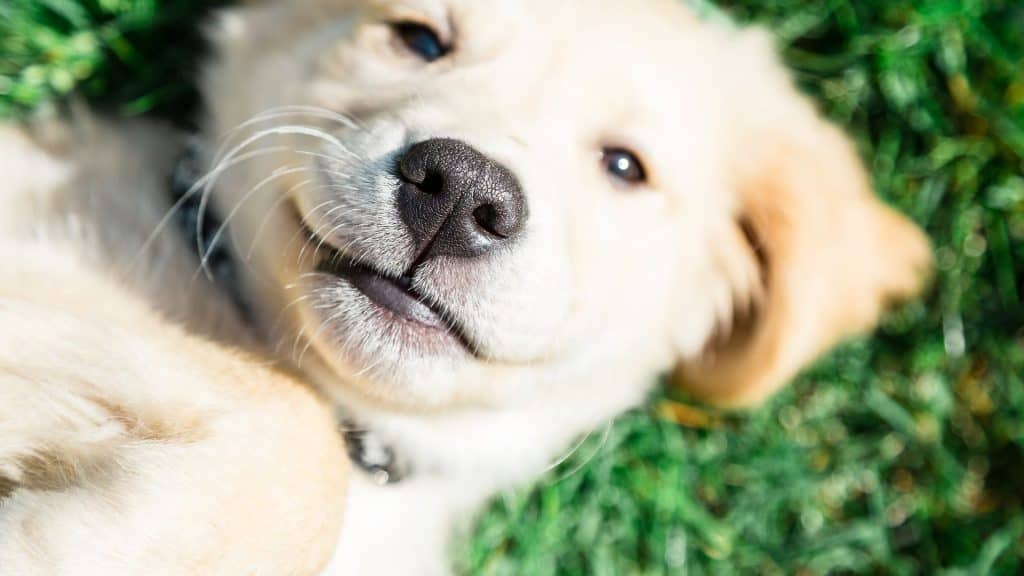
If you’re the proud owner of a new puppy, you may have noticed that their nose isn’t always wet.
In fact, it’s not unusual for puppies to have a dry nose from time to time. However, if your puppy’s nose is persistently dry, it could be a sign of a health problem.
A few things can cause a puppy’s dry nose, including dehydration, allergies, and an infection.
If your puppy is dehydrated, their skin will be dry, and their nose will be one of the first places to show it.
Allergies can also cause a dry nose, as can an infection. If your puppy has an infection, their nose will likely be warm to the touch, and they may have other symptoms like discharge or sneezing.
If you’re concerned about your puppy’s dry nose, the best thing to do is to take them to the vet.
Only a professional can rule out any serious health problems and give you peace of mind.
In the meantime, you can help keep your puppy’s nose moist by applying a small amount of petroleum jelly to it several times a day.
What Does It Mean if My Dog’s Nose Is Dry?
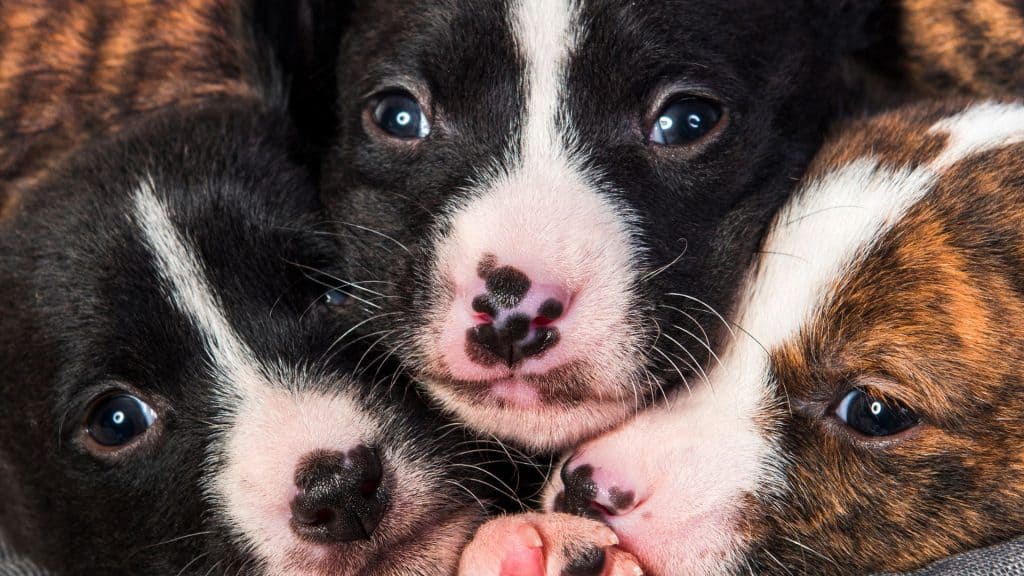
If you’ve ever had a close encounter with a dog, you know that their noses are usually wet.
This is no coincidence – dogs sweat through their noses to help regulate their body temperature.
So, if you notice that your pup’s nose is dry, it could be a sign that they’re not feeling well.
There are a few different reasons why a dog’s nose might be dry, including dehydration, sickness, or an allergy.
If your dog’s nose is dry and they’re also showing other signs of illness, such as lethargy or loss of appetite, it’s best to take them to the vet. But if their nose is the only thing out of the ordinary, consider giving them a little extra water and keeping an eye on them for any other unusual symptoms.
A dry nose might not cause alarm, but it’s always better to err on the side of caution when it comes to our furry friends.
Why Do Dogs Have Dry Noses?
One of the most distinctive features of dogs is their dry noses. But have you ever wondered why this is? It turns out that there are a few reasons.
First of all, dry noses help to absorb scent particles. This is important for dogs since they rely heavily on their sense of smell.
A wet nose would simply spread the particles around, making it harder for them to pick up on a particular scent.
A dry nose also helps keep the inside of a dog’s nostrils from getting irritated.
Wet noses are more susceptible to bacterial growth, which can lead to infection. So next time you see your dog with a dry nose, don’t worry – it’s just nature’s way of taking care of them!
Dehydration
Did you know that dehydration can kill your creativity?
It’s true.
When you’re dehydrated, your brain doesn’t function as well as it should.
You may feel tired and sluggish, and your thinking may be fuzzy. All of this can affect your creativity.
So make sure you drink plenty of water daily, especially if you plan to do any creative work.
Always keep a bottle of water with you, and often drink throughout the day. You’ll find that your creativity improves dramatically when you’re properly hydrated.
Dry Eye or Blocked Tear Ducts
Dry eyes, or blocked tear ducts, can be a significant obstacle to creativity.
Blocked tear ducts can cause the eyes to become inflamed and irritated, leading to discomfort and a general feeling of being unwell.
This makes it difficult to focus on tasks and can lead to a lack of productivity.
In severe cases, it may even be impossible to work due to the pain and inflammation.
Idiopathic Nasodigital Hyperkeratosis
Dry noses are common in puppies. It results from their still-developing immune system and can last anywhere from a few weeks to a few months.
There’s no need for concern in most cases – your puppy will eventually grow out of it.
However, if the dryness persists beyond four months of age or is accompanied by other symptoms, such as excessive sneezing or coughing, you should take your puppy to the vet for a check-up.
Hereditary Nasal Parakeratosis in Dogs
Hereditary Nasal Parakeratosis is a condition that affects the nose of specific breeds of dogs. The nose becomes dry, cracked, crusty, and may eventually bleed.
This condition is not painful but can be unsightly and may cause your dog to have trouble breathing.
There is no cure for Hereditary Nasal Parakeratosis, but there are treatments that can help to keep the nose moist and prevent further damage.
If you think your dog may have this condition, please see your veterinarian for a diagnosis and treatment plan.
Autoimmune Disorders
Autoimmune disorders are a broad category of conditions when the body’s immune system attacks healthy cells, tissues, and organs.
Autoimmune disorders affect almost anybody, including the skin, joints, muscles, nerves, glands, blood vessels, and brain.
More than 80 types of autoimmune disorders are a leading cause of death and disability in the United States.
Some common types include rheumatoid arthritis, lupus, multiple sclerosis, psoriasis, celiac disease, and type one diabetes.
Autoimmune disorders are complex conditions with many possible causes. In some cases, they may be genetic.
Canine Distemper
Canine distemper is a highly contagious and often fatal virus that affects dogs of all ages and wild canids such as foxes, wolves, and coyotes.
The disease is caused by a paramyxovirus and is characterized by a high fever, thick mucus from the nose and eyes, and hardening of the footpads and nose.
Canine distemper is often seen in puppies and young dogs but can occur in any age group.
There is no specific treatment for canine distemper, and it is often fatal, especially in younger dogs.
Vaccination is the best way to prevent the disease.
Fever
A puppy with a dry nose could have a fever. If your puppy’s nose is dry and they are lethargic, not eating, or have diarrhea, they could have a fever, and you should take them to the vet.
Allergies
Allergies can also cause dry noses. If your pup is scratching a lot, has watery eyes, or is sneezing, they might have allergies, and you should take them to the vet.
Signs You Should Take Your Dog to The Vet
If your dog has a dry nose, it could be a sign that something is wrong. Here are some other signs to watch out for:
- Your dog is lethargic and doesn’t want to play.
- Your dog has lost its appetite.
- Your dog is panting more than usual.
- Your dog is drinking more water than usual.
- Your dog has diarrhea or vomiting.
- Your dog’s gums are pale.
- Your dog’s body temperature is below average.
- Your dog has seizures.
If you notice any of these signs, you must take your dog to the vet immediately.
A dry nose could signify dehydration, an infection, or something more serious.
Don’t wait to see if the symptoms go away on their own- get your dog to the vet as soon as possible.
Why Is My Dog’s Nose Dry? – Reasons for Dry Nose in Healthy Dogs
Your dog’s nose is an essential part of her body. It helps her to smell and breathe, and it also regulates her body temperature. So, when your dog’s nose is dry, it can cause concern.
There are several reasons why your dog’s nose may be dry. The most common cause is simple environmental factors, like dry air or low humidity.
If your dog lives in a naturally dry climate, her nose may be more prone to drying out.
Other causes of the dry nose in dogs include:
- Allergies
- Dietary deficiencies
- Excessive licking or nose-picking
- Medical conditions, such as hypothyroidism or diabetes
In most cases, a dry nose is nothing to worry about. However, if your dog’s nose becomes cracked or bleeding, it could signify a more serious problem.
If you notice any changes in your dog’s nose, always check with your veterinarian to rule out any underlying health issues.
After a Nap, Why Is My Dog’s Nose Dry and Crusty?
If you’ve ever noticed your dog’s nose is dry and crusty after a nap, there’s no need to worry. It’s perfectly normal!
When your dog sleeps, her body temperature drops, and her metabolism slows down. This can cause the moisture on her nose to evaporate, leaving her with a dry and crusty nose.
If your dog’s nose is chronically dry and crusty, it could indicate an underlying health condition.
If you notice any changes in your dog’s nose, always check with your veterinarian to rule out any potential health problems.
Certain Breeds Are More Prone to Dry Noses
Certain dog breeds are more prone to dry noses than others. These include:
- Bulldogs
- Pugs
- Boston Terriers
- Boxers
- Shih Tzus
- Dalmatians
If you have one of these breeds, you may need extra care to keep their nose moisturized. This can be done with a simple pet-safe nose balm or cream.
Change in weather, climate, or season
One of the most common reasons for a dry nose is a change in weather, climate, or season.
If your dog’s nose is ordinarily moist and healthy but suddenly becomes dry and cracked, it could be due to a change in her environment.
Dry air, low humidity, and cold weather contribute to a dry nose.
If your dog spends a lot of time outdoors in these conditions, her nose may become dry and cracked.
To help prevent a dry nose, try using a humidifier in your home and limiting your dog’s time outdoors in cold weather.
You can also apply a pet-safe nose balm or cream to help keep her nose moisturized.
Dehydration After Exercise
If your dog’s nose is dry and crusty after a strenuous exercise session, she may be dehydrated. Dogs can quickly become dehydrated during exercise, especially in hot weather.
Signs of dehydration in dogs include:
- Dry mouth
- Lethargy
- Loss of appetite
- Decreased urination
If you think your dog is dehydrated, offer her plenty of fresh water and let her rest in a cool, shaded area. If she doesn’t improve after 30 minutes, take her to the vet for treatment.
Age
As dog’s age, their skin can become drier and less elastic. This can cause the nose to crack and bleed. If your dog’s nose is dry and cracked, it’s essential to moisturize it regularly with a pet-safe balm or cream.
Certain medical conditions, such as diabetes and hypothyroidism, can also cause a dry nose. If you notice any changes in your dog’s nose, always check with your veterinarian to rule out any potential health problems.
How to Keep Your Dog’s Nose Moisturized
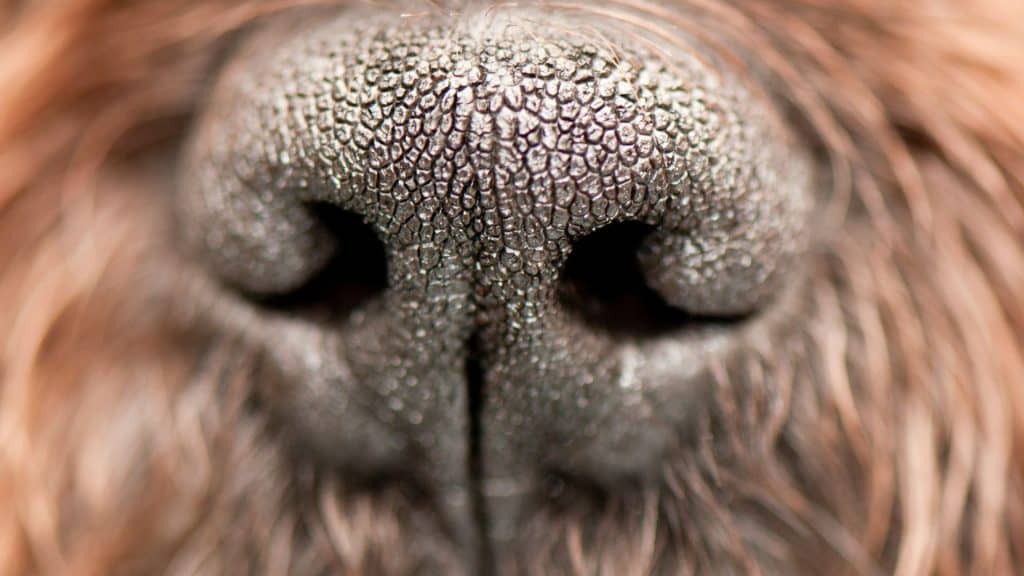
If your dog’s nose is dry, there are a few things you can do to help keep it moisturized:
- Apply a pet-safe nose balm or cream to help keep the nose moisturized.
- Use a humidifier in your home to add moisture to the air.
- Limit your dog’s time outdoors in cold or dry, arid conditions.
- Ensure your dog is well-hydrated by offering fresh water and never forcing her to exercise when she’s hot or tired.
FAQs
Why Does My Puppy Always Have a Dry Nose?
A dry nose is typical in puppies because their noses are not yet fully developed. As a puppy’s nose becomes moister, the chances of developing infections decrease.
Should a Puppy Nose Be Wet or Dry?
A puppy’s nose should be wet, as this is how they keep cool and smell things. If your puppy’s nose is dry, you can use a humidifier to help make it moister.
What Can I Put on My Puppy’s Dry Nose?
Petroleum jelly is a standard treatment for a dry nose in puppies. You can also try using a humidifier in the room where your puppy spends most of its time. You may want to take your puppy to the vet if the problem persists.

